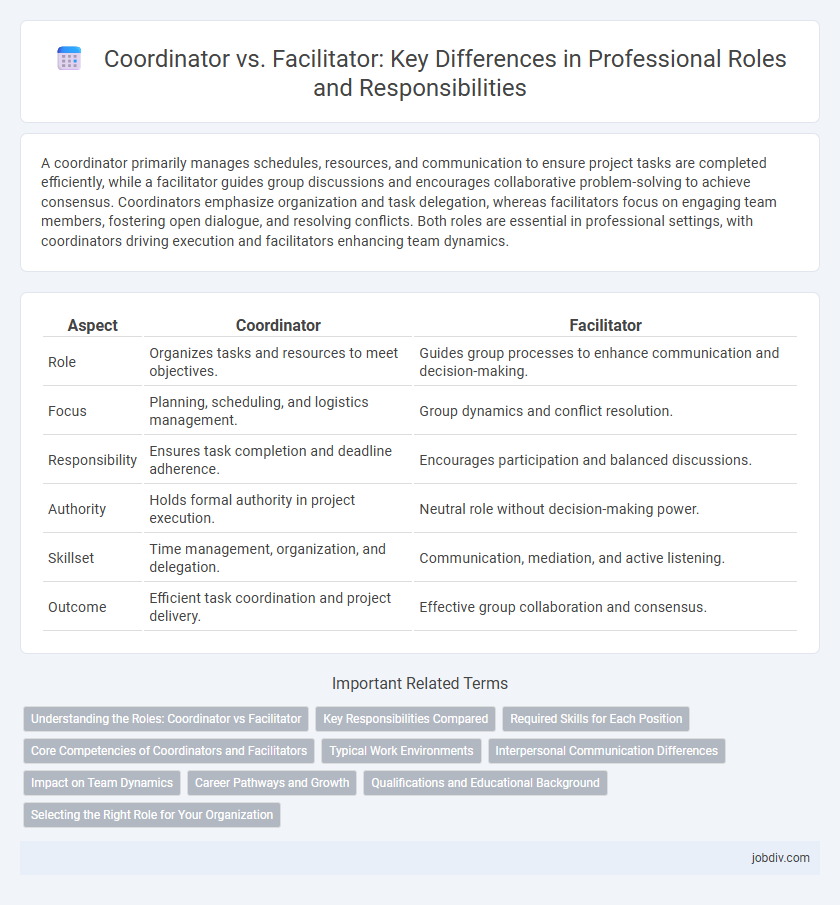A coordinator primarily manages schedules, resources, and communication to ensure project tasks are completed efficiently, while a facilitator guides group discussions and encourages collaborative problem-solving to achieve consensus. Coordinators emphasize organization and task delegation, whereas facilitators focus on engaging team members, fostering open dialogue, and resolving conflicts. Both roles are essential in professional settings, with coordinators driving execution and facilitators enhancing team dynamics.
Table of Comparison
| Aspect | Coordinator | Facilitator |
|---|---|---|
| Role | Organizes tasks and resources to meet objectives. | Guides group processes to enhance communication and decision-making. |
| Focus | Planning, scheduling, and logistics management. | Group dynamics and conflict resolution. |
| Responsibility | Ensures task completion and deadline adherence. | Encourages participation and balanced discussions. |
| Authority | Holds formal authority in project execution. | Neutral role without decision-making power. |
| Skillset | Time management, organization, and delegation. | Communication, mediation, and active listening. |
| Outcome | Efficient task coordination and project delivery. | Effective group collaboration and consensus. |
Understanding the Roles: Coordinator vs Facilitator
A Coordinator primarily manages schedules, resources, and communication to ensure project tasks are completed efficiently, while a Facilitator guides group discussions and decision-making processes to enhance collaboration and consensus. The Coordinator's role centers on logistical organization and task execution, whereas the Facilitator focuses on interpersonal dynamics and conflict resolution. Understanding these distinctions helps organizations assign roles that optimize both operational flow and team engagement.
Key Responsibilities Compared
Coordinators manage project schedules, allocate resources, and ensure team adherence to deadlines, focusing on operational efficiency and task execution. Facilitators guide group discussions, foster collaboration, and resolve conflicts, emphasizing communication and process improvement. The key responsibility difference lies in coordinators driving task completion, while facilitators enable effective group interaction.
Required Skills for Each Position
Coordinators require strong organizational skills, proficiency in project management software, and the ability to manage timelines and resources effectively. Facilitators need excellent communication skills, conflict resolution abilities, and expertise in guiding group discussions to achieve consensus. Both roles benefit from leadership capabilities, but coordinators emphasize logistical precision while facilitators prioritize interpersonal dynamics and engagement.
Core Competencies of Coordinators and Facilitators
Coordinators excel in organizational skills, project management, and resource allocation, ensuring tasks are completed efficiently within set timelines. Facilitators demonstrate strong communication, conflict resolution, and group dynamics expertise, enabling effective collaboration and decision-making among team members. Both roles require adaptability, leadership, and problem-solving abilities but apply these competencies in distinct operational contexts.
Typical Work Environments
Coordinators typically work in structured corporate settings such as project management offices, event planning companies, and healthcare administration, where they manage schedules, resources, and communications to ensure seamless operations. Facilitators are often found in collaborative environments like workshops, training sessions, and team meetings within educational institutions, consulting firms, and nonprofit organizations, guiding group discussions and decision-making processes. Both roles thrive in dynamic workplaces requiring effective interpersonal skills, but Coordinators emphasize logistical oversight while Facilitators focus on enabling group interaction and consensus.
Interpersonal Communication Differences
Coordinators typically manage tasks and schedules, emphasizing directive communication to ensure goals are met efficiently, while facilitators prioritize open dialogue and active listening to foster collaboration and consensus among team members. The coordinator's communication style often centers on clarity and authority to guide processes, whereas facilitators use empathetic and inclusive language to encourage participation and resolve conflicts. These interpersonal communication differences significantly impact team dynamics, influencing how information flows and how team members engage with one another during projects.
Impact on Team Dynamics
A coordinator organizes tasks and resources to ensure project deadlines are met, which provides structure and clarity for the team's workflow. A facilitator promotes open communication and collaboration, enhancing team cohesion and fostering a culture of shared problem-solving. Both roles influence team dynamics by balancing task management with interpersonal engagement to optimize overall performance.
Career Pathways and Growth
Coordinators typically manage project logistics and team schedules, providing a foundation in organizational skills essential for advancing into project management or operations roles. Facilitators emphasize guiding group discussions and fostering collaboration, developing interpersonal and leadership abilities that support career growth in team leadership or consulting. Understanding these distinct skill sets enables professionals to tailor career pathways toward either administrative management or strategic facilitation roles.
Qualifications and Educational Background
Coordinators typically possess a background in project management, business administration, or related fields, often holding bachelor's degrees or certifications such as PMP (Project Management Professional). Facilitators usually come from diverse educational backgrounds including psychology, communication, or organizational development, with many holding specialized training or certifications in facilitation techniques. Both roles require strong interpersonal skills, but coordinators emphasize procedural knowledge and organizational skills, while facilitators focus on group dynamics and conflict resolution expertise.
Selecting the Right Role for Your Organization
Selecting the right role between coordinator and facilitator depends on your organization's specific needs for structure and collaboration. Coordinators excel at managing schedules, resources, and logistics to ensure smooth project execution, while facilitators specialize in guiding group discussions and fostering consensus. Understanding whether your priority is operational efficiency or team engagement will help determine the most effective role for achieving organizational goals.
Coordinator vs Facilitator Infographic

 jobdiv.com
jobdiv.com